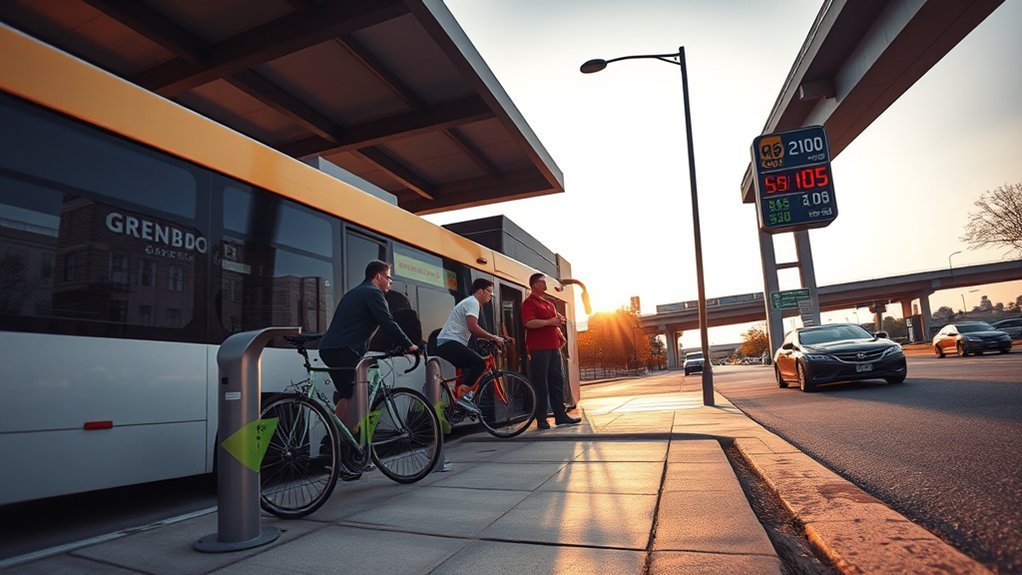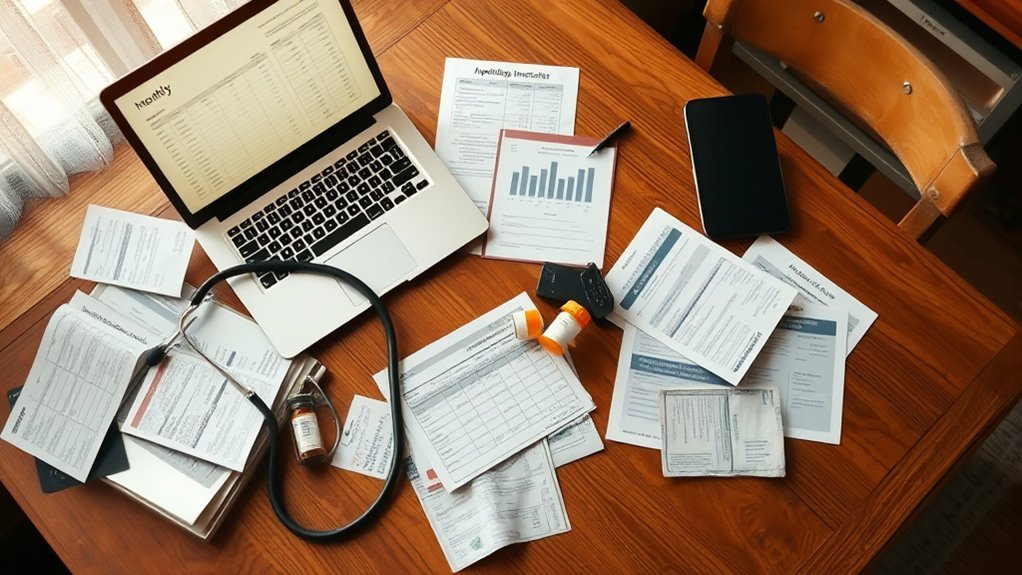If you’re planning a move to Greensboro, you’ll want clear numbers to set a realistic monthly budget; living costs run about 15.8% below the U.S. average, with typical single‑adult spending near $3,200. Rent and utilities are relatively affordable, groceries and transport add steady monthly costs, and homeownership looks attainable at current prices — but a few key details can change your tally, so keep going to see the exact breakdowns.
What Is the Cost of Living in Greensboro, NC?

While Greensboro’s overall cost of living is about 15.8% below the U.S. average (index 84.2), housing drives most of the savings — its housing index is 66.4 with a median home price near $229,900 — and rents run roughly $1,133 monthly on average (about $1,001 for one‑bed and $1,115 for two‑bed, though downtown/premium one‑beds can hit ~$1,541).
You’ll find Greensboro cost of living favorable if you prioritize lower housing costs within your monthly budget. With utilities per month near $148 for basics (about $277 including phone and internet), your essential expenses stay modest. Additionally, building a house can often be more expensive than buying an existing home, which may influence your housing decisions.
Transportation costs average about $9,427 annually for a single adult, though public transit fares are low if you use monthly passes. Compare median household income to the 30% rent rule to gauge affordability; one-bedroom rent and two-bedroom rent figures generally keep Greensboro in the ranks of an affordable city. Use these data points to build a practical, numbers-driven budget before relocating.
Rent and Housing Costs by Unit Type

You’ll see apartment rents vary by unit size and neighborhood, with medians around $879–$1,393 for studios, $1,000–$1,541 for one‑bedrooms (city median $1,001), and $1,115–$1,917 for two‑bedrooms (city median $1,115). Homeownership costs are generally higher and more variable—median house rent/value centers near $1,600 monthly with listings from about $165 to $5,000. The NOCO GB40 jump starter can provide significant cost savings by avoiding unexpected roadside assistance charges. Use the 30% rule: a $1,001 one‑bedroom implies roughly $3,337 gross monthly income (about $40,040/year) to be considered affordable.
Apartment Rent Breakdown
Compare rents by unit type to plan your budget: the average apartment in Greensboro runs about $1,135 per month for roughly 733 sq ft, with median one‑bedroom rent near $1,001 and median two‑bedroom around $1,115.
You’ll use Greensboro rent figures to set realistic monthly housing cost expectations: citywide medians vary, with other reports showing one‑bedroom $1,135, two‑bedroom $1,281, three‑bedroom $1,535.
In higher‑cost neighborhoods expect studio $1,393, one‑bedroom $1,541, two‑bedroom $1,917.
Compare apartment size to price when choosing units.
Apply the 30% rule to translate rent into gross income needed: affording a $1,001 one‑bedroom requires about $3,337 monthly (≈$40,040/year).
Use these median rent figures to build your cost of living Greensboro budget.
Homeownership Affordability
Because home prices in Greensboro run about 32% below the U.S. median, buying can look more affordable than in many other metros, but you’ll still need to weigh mortgage payments, taxes, insurance, and maintenance against local rents. The median home price is $229,900, so you’ll estimate monthly mortgage based on your down payment and current rates; include Guilford County property taxes and routine homeownership costs when comparing to rent.
Higher-end neighborhoods like Westerwood and Fisher Park push prices up; cheaper nearby markets (Reidsville) lower your baseline.
- Calculate total monthly cost: principal+interest, property taxes, insurance, maintenance.
- Compare to median rent ($1,133) and unit-specific rents.
- Factor down payment and long-term equity vs flexibility of renting.
Utilities, Internet and Monthly Service Expenses

With average monthly utility bills around $257.69 in Greensboro, you can expect electricity ($135.01), gas ($40.40), water ($78.84) and small fuel costs ($3.43) to make up most of your monthly outlay.
Your electricity bill and water bill are the largest drivers, but basic utilities for a roughly 915 sq ft apartment typically run about $148.09 per month (electricity, heating cooling, water, garbage). Greensboro’s utilities index sits near the U.S. average (~95.5), so you won’t see large regional premiums.
If you add phone bill and Internet cost, plan on about $277.34 monthly for combined basic utilities plus unlimited-data Internet (60 Mbps+) and phone. Standalone Internet/phone/cable bundles average $129.25 per month.
With about 217 sunny days a year, heating cooling needs — and winter gas use — can be modestly lower. Use this data to budget monthly service expenses realistically and shop bundles to reduce your total utilities spend. Additionally, maintaining your home’s exhaust system components can help prevent costly repairs down the line.
Food, Groceries and Dining Out

Typically, you’ll spend about $327 monthly on food in Greensboro — roughly $3,926 a year — which covers groceries and occasional dining out. Your monthly food budget reflects groceries prices near the national average (grocery index 95.8): expect staples like milk at ~$3.50 per gallon and rice near $2 per pound.
That keeps the city’s food cost per month manageable within Greensboro’s below‑average cost of living (city score 84.2).
- Groceries strategy: shop basics and local stores to hold grocery bills near the median; staples and bulk buys cut per‑meal costs.
- Dining out plan: casual meals typically run $10–$30 per person, so limit restaurant nights to control the discretionary slice of your budget.
- Budget mix: after utilities and phone you may have $50–$300 monthly for discretionary dining; adjust eating out based on rent and income to stay within the overall cost of living. Additionally, consider implementing preventative measures to minimize unexpected expenses in other areas of your budget, such as technology repairs.
Transportation, Transit and Commuting Costs

Although Greensboro’s overall transportation costs are lower than many U.S. cities, you should plan for about $9,427 per year if you’re single and roughly $15,812 for a family of four to cover commuting, vehicle ownership, and fuel.
Those annual transportation costs reflect a transportation index around 75.3–83.9, meaning transit and driving are cheaper than national averages.
The Greensboro Transit Agency (GTA) runs 16 routes Monday–Saturday, seven on Sunday, and maintains 1,056 stops; HEAT adds five campus routes.
GTA fares are $1.50 per ride (discount $0.75), one-day unlimited $4 and a 31-day monthly pass $58 — a cost-effective public transit option if you commute regularly.
Factor in vehicle ownership and fuel for flexible commuting: insurance, maintenance and gas raise costs markedly.
Rideshare, taxi and car rental remain appreciably pricier alternatives.
To control commuting costs, compare GTA transit routes and pass pricing against your driving expenses and choose the mix that minimizes outlays for your routine. Additionally, keeping your vehicle well-maintained can prevent costly repairs such as air conditioning blowing hose replacements that may arise from neglect.
Healthcare, Insurance and Other Essential Bills

After factoring commuting and housing costs, plan for another steady set of monthly bills: medical expenses average about $259/month for a single adult and roughly $873/month for a two‑adult family with two children, though insurance premiums and out‑of‑pocket costs can shift those numbers; basic utilities (electric, gas, water, garbage) run about $148.09/month and cell + internet add roughly $129.25, bringing typical combined utilities and connectivity to about $277.34/month.
Plan for steady monthly bills: about $259 for individual medical, $873 for family, plus ~$277 for utilities and connectivity.
You should treat Greensboro healthcare costs as a fixed slice of your budget: the individual medical cost averages 3,109 per year while family medical cost sits near 10,478 per year. Factor health insurance premiums plus expected out‑of‑pocket expenses into your monthly healthcare budget. Additionally, consider the potential impact of legal representation costs when budgeting for expenses related to immigration matters.
Review employer coverage options first; if unavailable, compare marketplace plans for premiums, deductibles and network access. Prioritize emergency savings and annual review of claims to keep actual spending aligned with projections and avoid surprises.
- Track monthly healthcare and utilities
- Evaluate employer vs marketplace
- Build emergency buffer
Budget Examples: Single, Couple and Family Estimates

Because Greensboro’s cost of living runs about 15.8% below the U.S. average, you can expect lower monthly budgets than in many other cities: a single adult will likely need roughly $3,200/month (≈ $38,400/year) to cover rent (one‑bedroom $1,001–$1,135), utilities and basics (~$277/month), while a two‑adult household and a family of four both center around $3,660/month (family annual ≈ $43,920) that factors in larger housing ($1,100–$1,300 for two‑bedrooms), shared transportation and pro‑rated healthcare (family medical ≈ $10,478/year).
You can use these figures to plan realistic budgets: single person expenses focus on one-bedroom rent, utilities and internet, groceries and modest transport. For couples, couple household costs split housing and medical, trimming per-person spend. A family of four budget includes higher childcare, food and medical lines but benefits from shared housing. Additionally, understanding operational expenses can help ensure that all necessary costs are accounted for in your budget planning.
Remember housing index (66.4) and median home price (~$229,900) keep Greensboro cost of living and average rent below many metro areas, lowering your required monthly budget.
Frequently Asked Questions
What Is the Average Cost of Living in Greensboro, NC?
You’ll spend about $3,000–3,500 monthly in Greensboro: rent roughly $1,000–1,200, utilities and internet ~$277, groceries and essentials plus transport and healthcare bringing totals near $3k, reflecting overall cost index ~84.2.
What Is the Cost of Living in North Carolina per Month?
You’ll typically spend about $3,200 monthly for a single person and roughly $3,660 for a family in North Carolina, with rent, utilities, groceries, transportation, and healthcare driving most expenses across cities like Greensboro.
How Much Should Monthly Rent Cost?
Think of rent as your roof’s heartbeat: you should spend about 30% of gross income, so target roughly $1,000–$1,200 monthly in Greensboro, adjusting for neighborhood, unit size, and your full monthly budget needs.
What Is a Good Salary for Greensboro, NC?
A good salary in Greensboro is roughly $38,000–$45,000 annually for comfortable single-person living; you’ll cover rent, utilities, transport, food, and healthcare, while $45,000+ gives better savings and discretionary spending.
Conclusion
You can live comfortably in Greensboro without emptying your wallet — think roomy apartment for about $1,100, groceries near $327, and utilities plus internet around $277. With overall costs ~15.8% below the U.S. average and median home prices near $229,900, your monthly single‑adult budget of roughly $3,200 stretches far: it’s like fitting a full wardrobe, a stocked fridge, and an emergency fund into a carry‑on. Plan for insurance, taxes, and maintenance so surprises don’t burst the suitcase.


